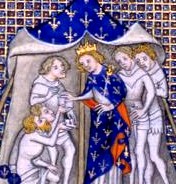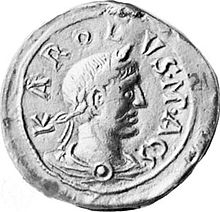Charles III (Eastern Franconia)



Charles III (* 839 ; † January 13, 888 in Neudingen ) from the noble family of the Carolingians was from 876 to 887 East Franconian king , from 879 to 887 king of Italy , from 882 ruler in Bavaria , Franconia and Saxony , from 885 to 887 West Franconian king and from 881 to 887 Roman emperor .
According to today's knowledge, he was wrong to carry the non-contemporary epithet of fat . In the German rulers lists he is referred to as the third , but not in French lists. In historical studies, Karl is regarded as a “weak” ruler, but this may also have something to do with his illness; he probably suffered from epilepsy .
Life
Karl was the third and youngest son of Ludwig the German and his wife Hemma from the Guelph family . In the division of the kingdom of his father, he was 865, the East Frankish part kingdom Alemannia assigned in which he assumed power after the death of the 876th
Karl profited from the expansion policy of his brothers, because after their death he also took over their parts of the empire in Eastern Franconia. In November 879 he received the Kingdom of Italy from his brother Karlmann , King of Bavaria and Italy, shortly before his death (September 22, 880). The partial kingdom of Bavaria initially received the third brother Ludwig the Younger . After his death on January 20, 882, Karl finally took over the king's power in the whole of Eastern Franconia.
Charles III had quite good relations with the papacy . On February 12, 881 he was crowned emperor by Pope John VIII in Rome, which further stabilized his position in the crumbling Carolingian Empire. However, Charles did not provide the support in Italy that the Pope had hoped for; his means of power were apparently insufficient for this. The high point of his reign was the (only short-term) unification of West and East Franconia. After the death of his second nephew Karlmann , the king of West Franconia , in December 884, Karl III. 885 proclaimed ruler there too.
Charles' reign was overshadowed by the continuing threat of Viking raids in the Rhineland , which he was unable to counter effectively. At times there were also tribute payments to the Normans . In 882 an agreement was reached at Asselt that was ultimately quite unfavorable for the empire, but other Norman groups repeatedly attacked the empire. A large Norman army even besieged Paris in 885/86 . Karl's government was also not able to assert itself in the entire empire. To make matters worse, Karl suffered from epilepsy and his health deteriorated further and further, so that he was practically no longer capable of governing. His most important political advisor was Liutward von Vercelli , who was overthrown in 887 by an intrigue at court.
In the west, Karl ruled until shortly before his death in 888. In eastern France, however, he lost power in November 887 after a brief armed conflict with his nephew Arnolf of Carinthia and abdicated at a Reichstag in the Palatinate of Trebur. Charles died on 13 January 888 in Neudingen on the Danube and was in the choir of the Abbey Church of St. Mary and St. Mark's on the Lake Constance situated island Reichenau buried.
In the Bavarian (Regensburg) continuation of the Annales Fuldenses for the year 888 it is noted that after the death of Charles many reguli (petty kings) in Europe seized power. The Carolingian empire had thus effectively disintegrated.
Marriage, offspring and succession
In 862 Karl married Richardis , daughter of the Alsatian Count Erchanger from the Ahalolfinger family , who became abbess in the Säckingen monastery in 877 and in Andlau in 887 . The marriage remained childless, but he and a concubine had an illegitimate son, Bernhard, who was probably born in 876 and killed in 891/892. Richardis himself left Karl due to court intrigue in 887 and retired to the Andlau monastery.
In the years from 879, when his marriage had remained childless for 17 years, Karl planned to build another member of the Carolingian House as his successor. In this context, the adoption of the West Franconian ruler Karlmanns in 883/884, who died in 884, is certain. It is possible that he had already had his older brother Ludwig III. adopted, but who had died in 882. When Karl finally became the sole ruler of the Franconian Empire, as numerous relatives had died, this possibility was largely eliminated. Now he made the attempt to get his biological son Bernhard through Pope Hadrian III. to be legitimized. But since Hadrian died on the way to the Frankish Empire in 885 and his successor's position on this question was by no means certain, this attempt also failed. In 887 Karl therefore adopted Ludwig Bosonides , who was descended from the Carolingian Ludwig II of Italy through his mother and thus had at least a certain dynastic legitimacy.
In the succession struggles after the death of Charles III. Bernhard did not play a significant role. Ludwig Bosonides was crowned emperor in 901, but only had a power base in Italy and was driven out and blinded by his rival Berengar I in 905 .
literature
- Wilfried Hartmann : The sons of Ludwig the German: King Karlmann, King Ludwig the Younger (III.), Emperor Karl III. In: Gerhard Hartmann, Karl Schnith (ed.): The emperors. 1200 years of European history. Marixverlag, Wiesbaden 2006, ISBN 3-86539-074-9 , pp. 71-81.
- Hagen Keller : To the fall of Charles III. About the role of Liutwards von Vercelli and Liutbert von Mainz, Arnulf von Kärnten and the east Franconian greats in the deposition of the emperor . In: German Archive for Research into the Middle Ages 22, 1966, pp. 333–384; also in: Eduard Hlawitschka (Hrsg.): King's election and succession to the throne in the Frankish-Carolingian period (= ways of research. Volume 247). Wissenschaftliche Buchgesellschaft, Darmstadt 1975, pp. 432–494.
- Simon MacLean : Kingship and Politics in the Late Ninth Century: Charles the Fat and the End of the Carolingian Empire ( Cambridge studies in medieval life and thought. Series 4, 57). Cambridge University Press, Cambridge 2003, ISBN 0-521-81945-8 .
- Rudolf Schieffer : Karl III. and Arnolf. In: Karl Rudolf Schnith , Roland Pauler (Hrsg.): Festschrift for Eduard Hlawitschka on his 65th birthday (= Munich historical studies. Department of Medieval History. Volume 5). Lassleben, Kallmünz / Opf. 1993, pp. 133-149.
Lexicon article
- Klaus Herbers : Karl III. (Eastern France). In: Biographisch-Bibliographisches Kirchenlexikon (BBKL). Volume 3, Bautz, Herzberg 1992, ISBN 3-88309-035-2 , Sp. 1133-1136.
- Theodor Schieffer : Karl III. In: New German Biography (NDB). Volume 11, Duncker & Humblot, Berlin 1977, ISBN 3-428-00192-3 , pp. 181-184 ( digitized version ).
- Engelbert Mühlbacher : Karl III . In: Allgemeine Deutsche Biographie (ADB). Volume 15, Duncker & Humblot, Leipzig 1882, pp. 157-163.
- Bernd Schneidmüller : Karl (III.) "The fat one" . In: Lexicon of the Middle Ages (LexMA). Volume 5, Artemis & Winkler, Munich / Zurich 1991, ISBN 3-7608-8905-0 , column 968 f.
Web links
- Literature by and about Charles III. in the catalog of the German National Library
| predecessor | Office | successor |
|---|---|---|
| Ludwig the German |
King of Eastern Franconia 876–887 |
Arnolf of Carinthia |
| Karlmann |
King of Italy 879–887 |
Berengar I. |
| Karlmann of Bavaria |
King of Bavaria 882–887 |
Arnolf of Carinthia |
| Karl the bald |
Roman emperor 881–887 |
Guido of Spoleto |
| Karlmann |
King of the West of France 885–887 |
Odo of Paris |
| personal data | |
|---|---|
| SURNAME | Charles III |
| ALTERNATIVE NAMES | Charlemagne |
| BRIEF DESCRIPTION | Roman Emperor and King of Eastern Franconia, King of the Western Franconian Empire and King of Italy |
| DATE OF BIRTH | 839 |
| DATE OF DEATH | January 13, 888 |
| Place of death | Neudingen |